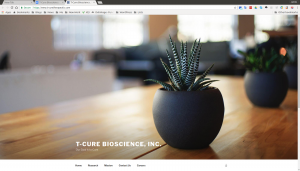(More on government funded inventions here. Other KEI comments on NIH licenses are found here.)
On November 29, 2017, the National Institutes of Health (NIH) has given a notice to a prospective license to patents on the treatment of renal cell carcinoma, a form of kidney cancer. The prospective licensee is T-Cure Bioscience Inc, which the NIH describes as “located in Thousand Oaks, California and incorporated under the laws of Delaware.”
On December 20, we looked at the T-Cure Bioscience’s website, which used a stock WordPress theme (including the default images). The entire web site included a home page and four additional pages.

The page on research had a single sentence. “T-Cure Bioscience focuses on isolating T cell receptors (TCR) to create both adoptive cell transfer and bi-specific antibody therapies that target solid tumors.”
The mission page also included a single sentence: “T-Cure Bioscience is committed to delivering effective and durable cancer therapies with minimal side effects through engineering and engaging patients’ immune cells.”
The careers page says the company is recruiting a scientist and a research associate.
The contact page gives two addresses, an email, and a phone number.
T-Cure Biosciences mailing address is listed as 22287 Mulholland Highway, Box 383, Calabasas CA 91302, which appears to be a mailbox at a UPS store. The company was registered in California in December of 2015.
The physical address for its material delivery facility is a company called “Ventura Biocenter”, which hosts a variety of tenants in bioscience.
The phone number listed on T-Cure’s website is Ventura’s, and the operator answered as Amethyst Life Sciences, another tenant of the center. The extent to which T-Cure maintains a laboratory necessary to develop the publicly owned technology is unclear from its website.
T-Cure Biosciences is registered to Gang Zeng, PhD, an Associate Professor in Urologic Oncology at the University of California Los Angeles. According to the David Geffen School of Medicine: “Dr. Zeng joined UCLA from the National Cancer Institute in 2002. He is a tumor immunologist with an interest in translational research. His research has been supported by peer-reviewed grants from the National Cancer Institute, Department of Defense, American Cancer Society, as well as a few private foundations.”
There were an estimated 63,390 new cases of renal cell carcinoma in 2017 in the US, and an estimated 14,400 deaths. While a variety of treatment options exist for patients with kidney cancer, the high mortality rate reflects the urgency which new treatments need to reach patients, at prices which they can afford.
KEI has asked the NIH for information about T-Cure Biosciences, and the decision to grant an exclusive license to a company that appears to have no physical offices and web page that could have taken 5 minutes to create using the stock “twenty seventeen” WordPress theme.